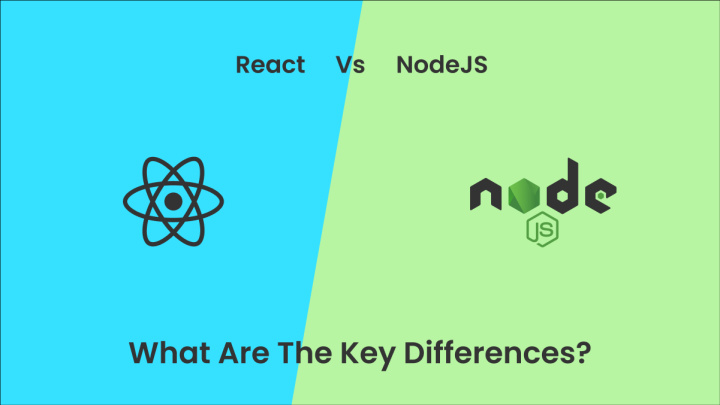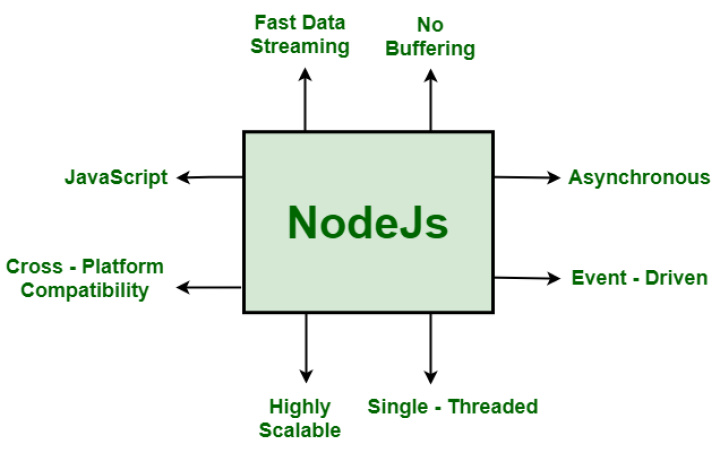React vs NodeJS: What are the key differences?
In today's competitive business market, developing a scalable web application is the most desired target for every organization. Hence, leveraging Node.js is the most popular option for giants like PayPal, Yahoo, LinkedIn, YouTube, Nasa, Netflix, Twitter, and others. As such, these organizations hire Node developers to enhance their performance and augment the team's productivity.
Content:
1. An Overview of Node.js and React.js
2. Node.js and its characteristics
3. Features
4. React.js and its characteristics
5. Comparison between Node.js and React.js
6. Why Hire Node.js Developers?
Here, the discussion will be around the two most popular JavaScript frameworks to select the most scalable and robust one.
An Overview of Node.js and React.js
As one of the most popular programming languages, JavaScript helps develop several tech-based frameworks for developers. Although React.js and Node.js are two subsets of JavaScript with high-performing ability, they are technically different. Hence, comparing both frameworks to choose the best one for developers is just like differentiating between a super-fast train and a sports car. Before going into an in-depth analysis, it can be stated that the fundamental difference between them is the types of usage.

While Node.js is mainly used at the backend or developing the server-side of an application, React.js is a front-end library to develop the user interfaces. In another way, both can be explained as different technologies to support web application development or react native app development services. But these two frameworks serve different purposes, which cannot be interchangeable at any cost. It will be noticed by those, who know how much does it cost to develop an app.
Node.js and its characteristics
As a backend technology, Node.js is powered by Google Chrome's V8, an open-source high-performance, JavaScript and Web Assembly engine. More simply, Node.js can be defined as an open-source, cross-platform library to help clients in developing web applications swiftly. Also, with the help of the best Node.js frameworks, developers can host APIs, serve HTTP requests and easily access the database.
Created by Ryan Dahl and the initial version released in 2009, Node.js is used by developers to write server-side scripting, create command-line tools, and produce dynamic web pages. Besides, the event-driven architecture facilitates concurrent operations without any single thread locking up, and due to not being interdependent on nature, you can perform the tasks quickly.
For real-time applications like Trello's collaboration tools and Netflix's start-up time, Node.js is the best choice due to its fast and powerful features. Instead of selecting the cumbersome model, Node.js uses a constant event stack to send concurrent small requests for processing incoming requests. As such, most of the leading organizations hire Node.js developers to enhance their performance in the competitive business market.
Features
The following diagram will define the key features of Node.js



The features of Node.js have a direct impact on the functions, and thereby, for getting a clear idea, a glance is given here-
- Data collection from forms
- Addition, deletion, and modification of data in the database
- Rendering dynamic web page content
- Creation of files on the server with subsequent tasks like reading, writing, deleting, and closing
By considering these, it can be stated that Node.js is-
- Single-threaded - This framework is very scalable as it employs a single-threaded architecture with event looping. The typical servers process requests by creating limited threads. However, in contrast to this, the event mechanism of Node.js functions in a non-blocking way to enhance its scalability. When compared with traditional servers like Apache HTTP, Node.js can handle a significantly large number of requests due to its use of a single-threaded program.
- Scalability - Addressing one of the topmost concerns in software development, Node.js meets the demand of modern organizations. Scalability has been a rising issue in recent times, and when we talk about concurrent requests, Node.js is efficient enough to handle it smoothly. The cluster module of this framework manages the load balancing of all active CPU cores. Significantly it can be able to execute horizontal partitions of the applications and cater to organizations the facility to provide distinct app versions to different target audiences. Hence, with this framework, clients’ preferences can be customized.
- Asynchronous and Event-driven - The Node.js library’s APIs are asynchronous, and the server with Node.js does not wait for data from an API. After accessing an API, the server moves to the next one and uses an event-driven mechanism to receive and track the responses of previous API requests.
- Quick execution of code - This framework uses the V8 JavaScript Runtime motor, which Google Chrome also embraces. Hub provides a wrapper for the JavaScript motor, which makes its runtime faster. As a consequence, the preparation of requests within Node.js also becomes faster.
- Cross-platform Compatibility - Using up on a variety of systems, like Windows, Unix, Linux, Mac OS X, and mobile devices, Node.js can be paired with an appropriate package to generate a self-sufficient executable.
- JavaScript Usage - Node.js library uses JavaScript, an important aspect from an engineer's perspective. Due to familiarity with JavaScript, the developers find that working with Node.js is much easier.
- No Buffering in Node.js application.
- Fast Data Streaming - Due to data streaming through multiple streams, processing time takes much longer. Processing data at a very fast rate, this framework simultaneously uploads and processes a file. Thereby it not only saves time but, at the same time, improves the overall speed of the data and video streaming.
Due to all these features, organizations prefer to hire Node.js developers to build real-time applications from scratch.
React.js and its characteristics
As a front-end technology, React.js is not a programming language, and for developing dynamic and interactive applications, Meta (Facebook) created this JavaScript Library. Additionally, Meta meant to create a dynamic library with high performance, and hence, developed this framework. And in this regard, the team emphasized on building better UI/UX design for web and mobile applications. And in this regard, the dedicated team emphasized on building better UI/UX design for web and mobile applications.
This framework provides a lot of flexibility to developers, as API has no dependency on jQuery or other libraries in comparison to how most JavaScript frameworks behave. Further, the easy debugging process to divide the codes into components makes React.js the best choice for leading websites and social media apps like New York Times website and Twitter app, respectively.
Recognized for creating user interfaces for content-based websites and apps, this high-performer and organized solution provider has the following features-
- Easy maintenance - By reutilizing framework components, this library resolves any type of issues associated with React updates;
- Performance - Using Virtual DOM (Document Object Model), React.js improves app performance;
- Stable code - Ensures code stability and improves app performance by using only downward data flow;
- Developer toolset - Developers can avail debugging and design tools, and as a result, React.js ensures high performance;
- Mobile app development - Same design pattern is followed to build rich UI for native apps supported by iOS and Android platforms.
Comparison between Node.js and React.js
The following table will give an overview of the two:
| Parameters | Node.js | React.js | Created by | Developed in 2009 by Ryan Dehl | Developed in 2013 by Jordan Walke |
| Application | Used in back-end application | Used in front-end application |
| Model View Controller Support | It supports the framework of Model-View-Controller | It does not support the framework of Model-View-Controller |
| Code Execution | Node.js runs on Google Chrome’s V8 engine | React.js uses Node.js for Compilation of codes |
| User Requests | Apart from database calls, it also handles authentications and requests from the browser | It handles API calls |
| DOM | Not uses the concept of Document Object Model | Uses Document Object Model concept |
| Language | JavaScript | JavaScript and JSX |
| Real-time Data Streaming | Node.js can easy handle real-time data streaming | Tracking the legacy approach is quite difficult due to its complex architecture |
| Popularity | Node.js is more popular than React.js | In Comparison to Node.js, less popular |
| Example of Users | Uber, PayPal, NASA, eBay, etc. | Meta (Facebook), Instagram, Netflix, etc. |
From the above, it is quite clear why the leading organizations hire Node.js developers to boost their productivity and performance.
Why Hire Node.js Developers?
Most of the business giants in recent times want to build an enterprise-level robust data-intensive web application and thereby hire Node.js developers to give the business app an effective as well as a solid shape. It is always better to hire these developers as they understand the business requirements, provide customized solutions, work on an existing complex system, and build Real-time top-class applications from scratch. Besides, to host web and mobile applications and build robust APIs, the organizations need to hire Node.js developers to optimize their business requirements and boost productivity.

